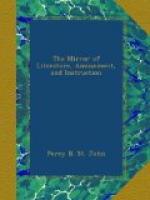The appearance of the country, in general, had much in it that was peculiar. The travellers perceived at every turn some marks of the king’s singular character. Provence, as the part of Gaul which first received Roman civilization, and as having been still longer the residence of the Grecian colony who founded Marseilles, is more full of the splendid relics of ancient architecture than any other country in Europe. Italy and Greece excepted. The good taste of King Rene had dictated some attempts to clear out and to restore these memorials of antiquity. Was there a triumphal arch, or an ancient temple—huts and hovels were cleared away from its vicinity, and means were used at least to retard the approach of ruin. Was there a marble fountain, which superstition had dedicated to some sequestered naiad—it was surrounded by olives, almond, and orange trees—its cistern was repaired, and taught once more to retain its crystal treasures. The huge amphitheatres, and gigantic colonnades, experienced the same anxious care, attesting that the noblest specimens of the fine arts found one admirer and preserver in King Rene, even during the course of those which are termed the dark and barbarous ages.
A change of manners could also be observed in passing from Burgundy and Lorraine, where society relished of German bluntness, into the pastoral country of Provence, where the influence of a fine climate and melodious language, joined to the pursuits of the romantic old monarch, with the universal taste for music and poetry, had introduced a civilization of manners, which approached to affectation. The shepherd literally marched abroad in the morning, piping his flocks forth to the pasture, with some love sonnet, the composition of an amorous troubadour; and his “fleecy care” seemed actually to be under the influence of his music, instead of being ungraciously insensible to its melody, as is the case in colder climates. Arthur observed, too, that the Provencal sheep, instead of being driven before the shepherd, regularly followed him, and did not disperse to feed, until the swain, by turning his face round to them, remaining stationary, and executing variations on the air which he was playing, seemed to remind them that it was proper to do so. While in motion, his huge dog, of a species which is trained to face the wolf, and who is respected by the sheep as their guardian, and not feared as their tyrant, followed his master with his ears pricked, like the chief critic and prime judge of the performance, at some tones of which he seldom failed to intimate disapprobation; while the flock, like the generality of an audience, followed in unanimous though silent applause. At the hour of noon, the shepherd had sometimes acquired an augmentation to his audience, in some comely matron or blooming maiden, with whom he had rendezvoused by such a fountain as we have described, and who listened to the husband’s or lover’s chalumeau, or mingled her voice with his in the duets, of which the songs of the troubadours have left so many examples. In the cool of the evening, the dance on the village green, or the concert before the hamlet door; the little repast of fruits, cheese, and bread, which the traveller was readily invited to share, gave new charms to the illusion, and seemed in earnest to point out Provence as the Arcadia of France.




